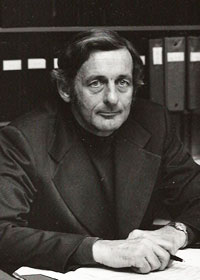Clarke Fraser's Biography

Clarke Fraser was born in 1920, in the United States, and spent much of his childhood in Jamaica, but his cultural roots were in Nova Scotia. During his pre-medical course at Acadia he became hooked on genetics, and, after his B.Sc. (1940), he entered graduate school in the Genetics Department at McGill. After completing his PhD in 1943 he joined the RCAF and, thanks to Veterans Allowances, he was able to enter medical school, receiving his MD degree from McGill in 1950. In lieu of an internship he started the Division of Medical Genetics at The Children's Memorial Hospital (now The Montreal Children's Hospital), and thus became Canada's first Medical Geneticist.
He busied himself at McGill with teaching and research, and with developing the principles of genetic counseling at The Montreal Chilren's Hospital. He eventually became the Molson Professor of Human Genetics at McGill, and remained there until, at age 62, he accepted a challenge to develop a program in Medical Genetics at Memorial University in St John's, Newfoundland. At 65, in 1985, he returned to McGill as Molson Professor Emeritus of Human Genetics, where he remained until 1999, when he returned, with his wife, Dr. Marilyn Preus, to his family home in Nova Scotia.
Research & Distinctions
Clarke did pioneering research in three areas: the genetics of human disorders, genetic counseling, and teratology (the experimental production of birth defects in mice). He also trained many graduate and post-doctoral students, who have gone on to productive careers in medical genetics or teratology in various parts of the world.
Clarke Fraser wrote some three hundred papers on human genetics and teratology, co-edited a four-volume Handbook of Teratology, and co-authored two textbooks on Human and Medical Genetics. He is a Fellow of the Royal Society of Canada, was appointed an Officer of the Order of Canada in 1985, and received a number of awards, including the Blackader Award of the Canadian Medical Association (1968), the Allen award (1978) and the Award of Excellence in Education (2000) from the American Society of Human Genetics. He also received the Wilder Penfield Prix de Quebec (1999), as well as three honorary degrees, from Acadia (1967), New York at Potsdam (1995), and Dalhousie University (2003).
Clarke served on a number of national and international committees, including the Canadian MRC Committee on Genetics, the NIH Genetics Study Section, and the WHO Expert Advisory Committee on Human Genetics. He was President of the American Society of Human Genetics, the Teratology Society, and the Canadian College of Medical Geneticists. From 1990 to 1993 he served as head of the working group on genetics and prenatal diagnosis of the Canadian Royal Commission on New Reproductive Technologies.
A Person of Character
Clarke is a quiet man, with a gentle sense of humour, who loves music and athletics, his family, and a Scotch before dinner. He played rugger until he was 40, and tennis until he was 82. He maintains his Emeritus Professorship at McGill, tries to keep up with the literature, and is still writing papers -- and this book.
Most genealogists do not record the important facts, like what diseases people had.
Clarke Fraser's Your Genealogy Affects Your Health helps to familiarize yourself with your family's history of disease, and shows what steps you can take to reduce your risk of getting a close relative's particular disorder.
Purchase your copy online
- Powell's
- Barnes & Noble
- Amazon
- Amazon.ca
- Chapters.Indigo
- iUniverse -- direct from publisher
Also in PDF version!